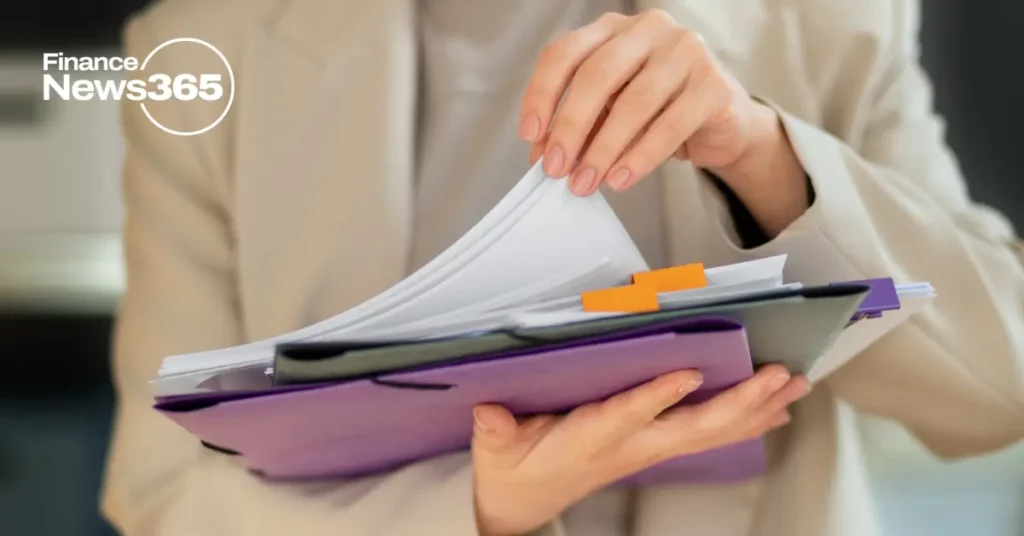You need specific documents for a personal loan, as they prove your identity, income, and address. Providing clear identification helps lenders verify who you are, while proof of income confirms your ability to repay the loan. Documents like recent pay stubs and tax returns are essential for establishing financial stability. Address verification, such as utility bills or lease agreements, reassures lenders of your reliability. Having these documents ready speeds up the approval process and minimizes the risk of denial. Understanding these requirements can enhance your application experience and increase your chances of securing the loan you need.
Overview of Personal Loans
A personal loan can be a flexible financial tool for meeting your needs, whether you’re looking to consolidate debt, tackle home improvements, or cover unexpected medical expenses.
These unsecured loans typically range from $1,000 to $50,000, allowing you to borrow an amount that suits your situation. With interest rates varying between 5% to 36%, your credit score plays a vital role in determining the rate you’ll receive.
When you start your personal loan application, you’ll need to gather required documents to prove your financial stability. Lenders assess your creditworthiness based on several factors, including your credit score, proof of income, and financial history.
The terms for these loans usually span from 1 to 7 years, giving you the flexibility to choose a repayment period that fits your budget.
The application process is often straightforward, allowing you to apply online or in-person. Approval times can range from just minutes to several days, depending on the lender’s policies.
Understanding the overview of personal loans is essential as you prepare to navigate the application process and gather the necessary documentation to secure the funds you need.
Application Requirements
When preparing to apply for a personal loan, it’s important to understand the specific application requirements. You’ll need to gather essential personal loan documents that help lenders assess your creditworthiness and financial stability. This usually includes a completed application form and two forms of identification, such as a government-issued ID. Having these ready can prevent delays in your application process.
Another critical element is proof of income. This documentation should accurately reflect your financial situation. If you’re employed, you’ll typically need to provide recent pay stubs or tax returns.
Self-employed individuals must submit additional documentation, including tax returns and bank statements from the last two years.
Additionally, you must verify your current address through documents like utility bills or lease agreements. Meeting these eligibility requirements guarantees your application is processed smoothly.
Identity Verification Documents
When applying for a personal loan, you’ll need to provide specific identity verification documents to confirm who you are.
Typically, lenders ask for two forms of ID, such as a government-issued photo ID and a Social Security card, to guarantee accurate verification and comply with regulations.
Keep in mind that clear images of these documents are essential, as any unclear submissions can slow down or jeopardize your application.
Required ID Types
To guarantee a smooth personal loan application process, you’ll typically need to provide two forms of identity verification. Lenders often request government-issued IDs, such as a driver’s license, passport, or military ID, as these documents serve as reliable proof of identity. A Social Security card may also be required, depending on the lender’s policy.
When submitting these IDs, make sure you provide clear images. Blurry or unclear photos can lead to delays in loan approval, making it vital to present your identification documents properly. By offering clear documentation, you demonstrate transparency and cooperation, which can enhance your chances of securing a loan.
In addition to identity verification, you may need to submit pay stubs to confirm your employment and income. This combination of documents helps lenders verify that you’re who you say you’re and that you can repay the loan.
Accurate and complete identity verification is essential in protecting lenders from fraud and guaranteeing that the information you’ve provided matches your actual identity. Meeting these requirements efficiently can greatly smooth the path to loan approval.
Importance of Verification
Understanding the importance of identity verification documents is fundamental for anyone applying for a personal loan, as these documents serve as the first line of defense against fraud. Lenders require these documents to confirm your identity and guarantee that you’re who you claim to be. Typically, you’ll need to provide at least two forms of identity verification, such as a government-issued photo ID like a driver’s license or passport.
Clear images of these documents are essential; blurry or unreadable submissions can lead to delays and additional requests, slowing down your application process.
Accurate identity verification helps lenders assess your creditworthiness and review your financial history, which greatly influences their decision on your loan approval. If you fail to submit the necessary identity verification documents, you risk a higher likelihood of application denial, which can hinder your financial goals.
Thorough preparation before applying for a personal loan is critical to avoid unnecessary setbacks. By guaranteeing you have the correct identity verification documents ready, you can streamline the process and improve your chances of securing the loan you need.
Proof of Income Documents
Since lenders need to verify your ability to repay a personal loan, providing proof of income documents is essential. These documents serve to confirm your financial stability and capability to manage monthly payments.
When applying for a loan, lenders typically require recent pay stubs from the last 2-3 months, as well as tax returns from the previous 1-2 years. This information helps them assess your consistent income levels.
If you’re self-employed, you’ll need to submit different documents to prove your income. Bank statements and profit-and-loss statements can effectively demonstrate your income reliability.
It’s vital to provide accurate and complete proof of income, as this greatly enhances your chances of loan approval and favorable terms.
Address Verification Documents
When applying for a personal loan, confirming your current residential address is just as important as proving your income. Lenders require address verification to guarantee they’ve accurate information for communication and documentation purposes. This helps them assess your stability and reliability, as a consistent address often indicates a stable living situation.
To provide documents for address verification, you can submit acceptable forms such as utility bills, lease agreements, mortgage statements, or bank statements that display your name and current address.
It’s vital to confirm these documents are clear and up-to-date, as doing so can expedite the loan approval process. When lenders receive complete and accurate information, they’re less likely to encounter delays caused by missing documentation.
On the other hand, failing to provide proper address verification may increase the risk of your loan being denied or lead to additional requests for documentation. Consequently, you should pay attention to this aspect of your application.
Bank Account Information
When applying for a personal loan, you’ll need to provide essential bank account information, including your bank name, routing number, and checking account number.
This information is vital for lenders to facilitate the direct deposit of funds once your loan is approved.
Ensuring that your bank details are accurate not only speeds up the application process but also helps prevent any delays in receiving your loan.
Required Bank Details
Most lenders require specific bank account details to process your personal loan efficiently. This includes your bank name, routing number, and checking account number. Providing accurate bank account information is essential, as it helps guarantee that the loan amount transfers securely and without delays.
When you submit your details, lenders require these to verify your identity and assess your creditworthiness. Some lenders may even ask for your online banking user ID and password, allowing them to securely check your account activity and evaluate your financial stability.
This step is significant, as it helps them confirm your income sources and overall financial health, which can impact their loan approval decisions. If you provide incomplete or incorrect bank information, it could lead to funding delays or complications, so it’s important to verify all your details are accurate before submitting your application.
Security Verification Process
To guarantee a smooth personal loan process, lenders implement a rigorous security verification process that relies heavily on your bank account information. This process often requires you to provide accurate bank statements, including details like your bank name, routing number, and checking account number. By doing so, lenders can verify your identity and assess your financial stability.
Lenders may also ask for proof of employment during this stage to ascertain you have a reliable income source. Some institutions might even request read-only access to your bank account, allowing them to evaluate your spending habits and overall financial health. This additional layer of scrutiny helps them decide whether to approve your loan application while complying with anti-fraud measures.
It’s essential to keep in mind that missing or incorrect bank account information can delay the loan approval process, potentially leading to funding setbacks. Consequently, make sure you have all necessary documents to verify your financial situation.
Providing accurate and complete information not only expedites the process but also increases your chances of securing the loan you need.
Fund Deposit Information
Providing accurate bank account information is vital for guaranteeing that your personal loan funds are deposited quickly and efficiently. Lenders require this information, including your bank name, routing number, and checking account number, to facilitate direct deposits upon approval.
When you provide accurate bank account details, you help guarantee a smooth transfer of funds, allowing you to access your loan proceeds within 1-2 banking days after your application is approved.
Some lenders may also request your user ID and password for secure verification of your bank account. This step helps them confirm that the information provided is legitimate and up to date.
Additionally, lenders might ask for read-only access to your bank accounts to assess your financial stability and verify income without compromising your account security.
Accurate bank account information is vital for timely funding, preventing delays in accessing the funds you need for urgent financial situations. These details directly impact the loan terms and the speed at which you can begin making monthly payments.
Additional Supporting Documents
When applying for a personal loan, including additional supporting documents can strengthen your application and boost your chances of approval. These additional documents provide lenders with a clearer picture of your financial situation.
For instance, proof of address, such as utility bills or lease agreements, can validate your residency, while income statements, including pay stubs or bank statements from the last 2-3 months, showcase your financial stability and regular income flow.
Furthermore, if you’re self-employed, you might need to submit profit-and-loss statements or business tax returns to verify your income. Employment verification letters can also enhance your credibility, assuring lenders of your stable income and job security.
If you have a co-signer or are offering collateral, documentation of these aspects can greatly increase your approval chances by providing additional security for the loan.
Finally, consider attaching a detailed budget outlining your monthly expenses and projected loan repayment, which can help lenders assess your financial health and repayment capabilities.
Common Reasons for Denial
When applying for a personal loan, several factors can lead to denial, and it’s important to understand them.
Missing or incomplete application submissions often hinder your chances, as lenders need all necessary information to make informed decisions.
Additionally, if your income documentation is insufficient or your credit score falls below acceptable levels, these issues can greatly impact your application outcome.
Incomplete Application Submission
Submitting incomplete applications often leads to unnecessary denials for personal loans. When you don’t provide these documents, like proof of identity or income, it markedly increases the likelihood of rejection.
Lenders require a complete set of documents to evaluate your financial situation accurately. If you fail to submit all necessary items, such as bank statements or proof of address, it can cause delays in the process or result in a denial.
Moreover, if you lack clarity in your financial information—like your income sources or monthly expenses—this uncertainty can further diminish your chances of approval. Missing documents can prolong the inquiry process, which may negatively impact your credit reports due to multiple credit pulls.
Additionally, errors or outdated information in your submitted documents, such as incorrect addresses or old pay stubs, can also lead to an incomplete application submission, increasing the risk of denial.
To improve your chances of securing a personal loan, confirm that you provide all required documents accurately and timely. This diligence not only streamlines the approval process but also safeguards your credit standing.
Insufficient Income Documentation
A key factor in securing a personal loan is providing sufficient income documentation. Lenders might require verifiable proof of income to assess your repayment capability and financial stability. Common documents you need include recent pay stubs, tax returns, or bank statements that show consistent income over the last one to two years.
If you’re self-employed, you may face additional scrutiny, as lenders expect thorough documentation like profit-and-loss statements and personal tax returns.
Insufficient income documentation can lead to denial because lenders perceive a higher risk if they can’t verify your income. For instance, a lack of diverse income sources or periods of unemployment during the application process can further decrease your chances of approval.
Additionally, missing or outdated income documentation can greatly delay the loan processing, increasing the likelihood of rejection based on inadequate financial verification.
To avoid these pitfalls, make sure you gather all necessary documents and present them clearly. By doing so, you help lenders assess your financial situation more accurately, improving your chances of securing the loan you need.
Low Credit Score
Many borrowers face challenges securing a personal loan due to a low credit score, which is often below 580. Lenders consider a low credit score as a signal of potential repayment issues, making it one of the primary reasons for loan denial.
Factors like missed payments, high credit utilization ratios above 30%, and a history of bankruptcies can contribute to your low credit score, impacting your financial situation.
When applying for a loan, lenders assess your creditworthiness based on your score, meaning higher scores generally lead to better loan terms and lower interest rates. If you’re facing a low credit score, it might result in higher interest rates, reduced loan amounts, or outright denials.
To improve your chances of securing a loan, focus on enhancing your credit profile. You can do this by making timely bill payments, reducing outstanding debt, and avoiding new hard inquiries before applying.
Additionally, maintaining a healthy debt-to-income ratio can further bolster your application. By addressing these areas, you can create a stronger financial foundation and increase your likelihood of loan approval.
Tips for Document Preparation
How can you guarantee a smooth application process for your personal loan? Start by organizing your documents into clear sections for identity verification, proof of income, proof of address, and bank account information. This structured approach streamlines the application process and helps you stay on top of everything.
Make sure all identification documents, like your driver’s license or passport, are current and have clear images. Lenders require accurate identity verification to avoid delays.
Next, gather verifiable income documentation, such as recent pay stubs and tax returns, since lenders use proof of income to evaluate your ability to repay the loan.
Don’t forget to collect proof of address documents, like utility bills or lease agreements, ensuring they display your name and current address to meet lender requirements.
Additionally, maintain a checklist of all required documents, reviewing them for completeness and accuracy before submission. This step is essential in preventing potential rejection or delays, especially when dealing with personal loans.
Next Steps After Denial
Facing a denial for your personal loan can be frustrating, but taking proactive steps can turn the situation around. Start by reviewing the lender’s reasons for denial; this gives you a clear picture of what factors contributed. You need to provide evidence that addresses these concerns. For instance, if your credit report shows inaccuracies or areas needing improvement, check these thoroughly. Fixing errors can enhance your chances in the future.
Next, explore alternative lenders with more flexible requirements. They might be more willing to work with you, even if you’ve been denied elsewhere. If possible, consider having a co-signer with a stronger credit profile; this can notably improve your approval odds.
Reassessing your financial situation is vital. Look at any weaknesses in your creditworthiness and address them before reapplying.
If you have a credit card, verify you’re managing it responsibly, as this can positively impact your credit score.
Conclusion
To summarize, gathering the necessary documents for a personal loan is vital for a smooth application process. These documents help lenders verify your identity, assess your financial stability, and guarantee you can repay the loan. Understanding what’s required can greatly enhance your chances of approval. If you face denial, reviewing your documentation and addressing any shortcomings can pave the way for future success. Be prepared, stay organized, and take the next steps confidently.
Finance News 365 is an online platform dedicated to providing individuals and businesses with comprehensive financial insights, market trends, and resources to make informed decisions.
Loan Application Guide
10 Best Tips to Accelerate Loan Approval Process
To expedite the loan approval process, first, clean up your credit report by correcting errors and maintaining timely payments. Keep your debt-to-income ratio below 36% and limit new debt accumulation. Request a reasonable loan amount that aligns with your financial situation, and consider using a co-signer to strengthen your application. Utilizing collateral for secured loans can lower risk for lenders. […]
Loan Application Guide
Easy Steps to Complete Your Loan Application
Completing your loan application requires a clear process. First, gather necessary information, including personal details, proof of income, and a summary of existing debts. Next, choose your application method, either online for convenience or in-person for direct support. Fill out the application form accurately, ensuring you provide all required documentation. Once completed, submit your documents and be prepared for […]
Loan Application Guide
Why Speed Up Your Approval Process?
Improving your approval process can boost efficiency and project outcomes; discover how to unlock faster decision-making and increased productivity.
Loan Application Guide
Loan Application Timeline: What to Expect
Beneath the surface of the loan application timeline lies a journey filled with crucial steps; uncover what to expect and how to navigate them effectively.
Loan Application Guide
Why Follow This Step-by-Step Loan Application Guide?
Unlock the secrets to a successful loan application by following this guide, and discover how to navigate the process with confidence.






